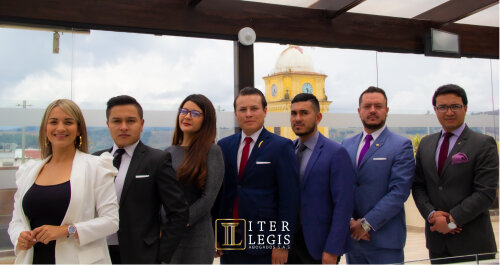Best Sanctions & Export Controls Lawyers in Tunja
Share your needs with us, get contacted by law firms.
Free. Takes 2 min.
List of the best lawyers in Tunja, Colombia
About Sanctions & Export Controls Law in Tunja, Colombia
Sanctions and export controls are important legal frameworks that regulate the movement of goods, technology, services, and capital across Colombia’s borders. In Tunja, just like the rest of the country, these laws ensure that individuals and businesses comply with national and international obligations. The main objective of sanctions is to restrict certain transactions with foreign entities or individuals, often for reasons related to national security, public policy, or compliance with United Nations or other international mandates. Export controls, on the other hand, aim to prevent unauthorized transfer or sale of controlled goods and technologies, particularly those with potential military applications or use in weapons of mass destruction.
Why You May Need a Lawyer
Sanctions and export controls can be complex, and violating these laws can have serious legal and financial consequences. Individuals, companies, or organizations in Tunja may need legal advice for several reasons:
- Planning to export or import goods that may be subject to restrictions
- Engaging in international transactions or partnerships
- Ensuring compliance with Colombian and international sanctions regimes
- Facing investigations or enforcement actions from customs or other authorities
- Uncertain about the licensing requirements for exporting certain products
- Encountering blocked assets or funds due to sanctions
- Needing to establish robust compliance programs for their businesses
Local Laws Overview
In Colombia, sanctions and export controls are governed by national laws aligned with international obligations, including:
- Law 1945 of 2018: Updates Colombian regulations on controlled goods and technologies with a focus on international trade and national security.
- Decree 153 of 2017: Implements control measures for dual-use goods, especially those with potential military applications.
- Ministry of Commerce, Industry and Tourism (MINCIT): Main regulator of export-import activities and licensing processes.
- Colombian Customs (DIAN): Oversees compliance at borders and ensures embargoed items are not being imported or exported.
- International Sanctions: Colombia enforces sanctions from the United Nations, and, in some cases, restrictions recommended by major partners such as the United States or European Union.
Frequently Asked Questions
What are sanctions and export controls?
Sanctions are restrictions imposed by governments to prohibit or limit trade and financial transactions with specific countries, entities, or individuals. Export controls regulate the export of certain products, technologies, or services for reasons of national security and to prevent misuse.
What government agencies enforce these laws in Tunja, Colombia?
The main agencies include the Ministry of Commerce, Industry and Tourism (MINCIT), the National Tax and Customs Directorate (DIAN), and, in some cases, the Ministry of Foreign Affairs.
Which goods are most commonly subject to export controls?
Products with military applications, dual-use goods (technologies used both for civilian and military purposes), pharmaceuticals, chemicals, electronics, and certain agricultural products are commonly controlled.
Do I need a license to export goods from Tunja?
If you are exporting controlled items or those listed under specific regulations, you will need an export license from MINCIT or other responsible agencies. Ordinary consumer goods may not require special permits, but it is important to verify each product’s status.
How do I know if my business partner is subject to sanctions?
You should check Colombian government databases and international lists, such as those maintained by the UN or other international bodies, to ensure your partners are not sanctioned entities or individuals.
What is dual-use technology?
Dual-use technology refers to products or knowledge that can be used for both civilian and military applications. Export of such items is tightly regulated in Colombia.
What are the penalties for violating sanctions or export controls?
Violations can lead to administrative penalties, confiscation of goods, revocation of trading licenses, substantial fines, and even criminal prosecution for severe offenses.
How can I ensure my business complies with relevant laws?
Establishing internal compliance programs, conducting regular training, keeping up to date with laws, and consulting with legal experts in the field are essential steps.
Can individuals be held responsible or is it only businesses?
Both individuals and businesses can be held responsible for sanctions and export controls violations. Responsible officers, employees, and directors may face legal consequences.
What should I do if my goods are seized at customs in Tunja?
You should immediately seek legal advice, gather all relevant documentation, and contact Colombian Customs (DIAN) to understand the reasons for the seizure and possible remedies.
Additional Resources
Here are some helpful resources for individuals and businesses seeking guidance on sanctions and export controls:
- Ministry of Commerce, Industry and Tourism (MINCIT) - Main authority for trade and export licensing
- National Tax and Customs Directorate (DIAN) - For customs procedures and compliance
- Ministry of Foreign Affairs - Updates on international sanctions and national policy
- Boyacá Chamber of Commerce - Local business support and compliance trainings
- Colombian Association of Foreign Trade (ANALDEX) - Industry association for foreign traders
- Local universities and law faculties - Often offer seminars or expert consultations for businesses in Boyacá region
Next Steps
If you require legal assistance in sanctions and export controls in Tunja, here are the steps you should take:
- Identify your specific issue or legal concern related to sanctions or export controls
- Collect all relevant documents, contracts, and correspondence related to the transaction or activity
- Seek out a qualified lawyer in Tunja with experience in international trade, customs law, or regulatory compliance
- Schedule a consultation to discuss your options and obligations
- Follow legal advice to either apply for necessary licenses, rectify compliance issues, or respond to any investigations
- Stay updated with changes in local and international regulations to ensure ongoing compliance
Lawzana helps you find the best lawyers and law firms in Tunja through a curated and pre-screened list of qualified legal professionals. Our platform offers rankings and detailed profiles of attorneys and law firms, allowing you to compare based on practice areas, including Sanctions & Export Controls, experience, and client feedback.
Each profile includes a description of the firm's areas of practice, client reviews, team members and partners, year of establishment, spoken languages, office locations, contact information, social media presence, and any published articles or resources. Most firms on our platform speak English and are experienced in both local and international legal matters.
Get a quote from top-rated law firms in Tunja, Colombia — quickly, securely, and without unnecessary hassle.
Disclaimer:
The information provided on this page is for general informational purposes only and does not constitute legal advice. While we strive to ensure the accuracy and relevance of the content, legal information may change over time, and interpretations of the law can vary. You should always consult with a qualified legal professional for advice specific to your situation.
We disclaim all liability for actions taken or not taken based on the content of this page. If you believe any information is incorrect or outdated, please contact us, and we will review and update it where appropriate.









